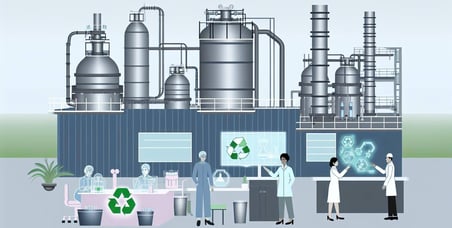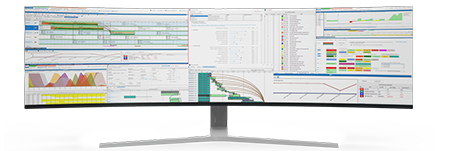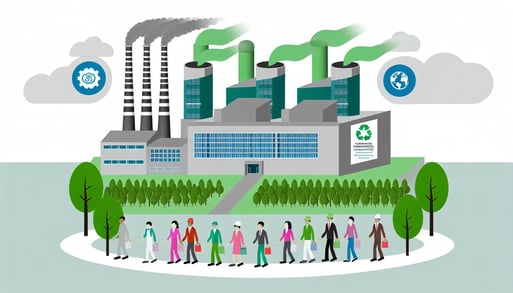The role of a Production Planner in chemical manufacturing is more critical than ever. As industries increasingly recognize the importance of sustainability and Corporate Social Responsibility (CSR), it becomes imperative for production planners to align their strategies with these values.
In this blog, we will explore the key principles of sustainable production planning and how integration between advanced planning tools like PlanetTogether and prominent ERP, SCM, and MES systems can enhance the effectiveness of these strategies.

Sustainable Production Planning
Sustainability in Chemical Manufacturing
The chemical industry is under growing pressure to reduce its environmental footprint and contribute to a more sustainable future. Sustainable production planning involves optimizing processes to minimize resource consumption, waste generation, and emissions while maximizing efficiency. This approach not only aligns with global environmental goals but also offers economic benefits in the long run.
Key Principles of Sustainable Production Planning
Resource Efficiency: Utilize raw materials and energy efficiently to minimize waste and reduce environmental impact.
Supply Chain Optimization: Optimize the supply chain to reduce transportation-related emissions and ensure timely delivery of materials.
Renewable Energy Adoption: Integrate renewable energy sources into production processes to reduce reliance on non-renewable resources.
Waste Reduction and Recycling: Implement strategies to minimize waste generation and explore recycling options to create a circular economy.
Compliance with Regulations: Stay informed and comply with environmental regulations to avoid legal issues and maintain a positive corporate image.


PlanetTogether: A Tool for Efficient Production Planning
PlanetTogether is a powerful Advanced Planning and Scheduling (APS) tool designed to optimize production processes. Its features include capacity planning, production scheduling, and scenario analysis, making it an ideal choice for manufacturing facilities aiming to enhance efficiency.
Integration with ERP, SCM, and MES Systems
To fully unlock the potential of sustainable production planning, integration with Enterprise Resource Planning (ERP), Supply Chain Management (SCM), and Manufacturing Execution Systems (MES) is essential. Let's explore the benefits of integrating PlanetTogether with prominent systems such as SAP, Oracle, Microsoft, Kinaxis, and Aveva.
SAP Integration: Combining PlanetTogether with SAP ensures a seamless flow of information between production planning and other business processes. Real-time data exchange enables better decision-making and resource optimization.
Oracle Integration: Integration with Oracle streamlines data sharing across various departments, improving overall operational efficiency. This enhances the accuracy of production plans and contributes to sustainability goals.
Microsoft Dynamics Integration: By integrating PlanetTogether with Microsoft Dynamics, production planners can leverage a user-friendly interface and advanced analytics for better insights into their production processes. This integration aids in making informed decisions aligned with sustainability objectives.
Kinaxis RapidResponse Integration: Integrating PlanetTogether with Kinaxis RapidResponse enhances agility in response to changing market dynamics. This integration ensures that sustainability considerations are seamlessly woven into adaptive production plans.
Aveva Integration: Combining PlanetTogether with Aveva MES ensures that the execution of production plans aligns with the intended sustainability goals. Real-time monitoring and control capabilities contribute to minimizing resource wastage.
Benefits of Integration
Enhanced Data Accuracy: Real-time integration eliminates discrepancies and ensures that planners work with accurate and up-to-date information.
Improved Communication: Seamless communication between different systems facilitates collaborative decision-making and ensures that sustainability considerations are integrated at every stage.
Optimized Resource Utilization: Integration with ERP, SCM, and MES systems allows for better coordination and utilization of resources, contributing to sustainable production practices.
Compliance and Reporting: Automated data exchange supports compliance with environmental regulations and enables accurate reporting on sustainability metrics.

Achieving Corporate Social Responsibility (CSR) Goals
Aligning Production Plans with CSR Objectives
Corporate Social Responsibility (CSR) has become a cornerstone of business ethics. By aligning production plans with CSR goals, chemical manufacturing facilities can enhance their reputation, attract environmentally conscious customers, and contribute positively to society.
Here are key strategies to achieve CSR goals:
Transparency and Accountability: Implement transparent reporting mechanisms to showcase progress in sustainability initiatives. This builds trust with stakeholders and enhances the company's CSR image.
Community Engagement: Involve local communities in sustainable initiatives and communicate how production planning practices contribute to the well-being of the community.
Supplier Collaboration: Collaborate with suppliers who share similar CSR values. Ensuring that the entire supply chain adheres to sustainable practices contributes to a more comprehensive CSR strategy.
Employee Training and Engagement: Educate employees about the importance of sustainability and involve them in identifying opportunities for improvement. Engaged employees are more likely to contribute actively to CSR goals.
Continuous Improvement: Regularly assess the impact of production planning strategies on CSR goals and identify areas for improvement. Implement a culture of continuous improvement to stay aligned with evolving sustainability standards.
In the realm of chemical manufacturing, sustainable production planning is not just an ethical imperative but also a strategic advantage. By integrating advanced planning tools like PlanetTogether with ERP, SCM, and MES systems, production planners can unlock new levels of efficiency and contribute significantly to CSR goals. As the industry continues to evolve, embracing sustainability becomes not only a responsibility but a key driver of success.
Production planners, armed with the right tools and strategies, can navigate this evolution and lead their facilities toward a more sustainable and socially responsible future.


